How To Sharpen Garden Hoe: Real Guide to the problem
Greetings fellow garden lovers! After 12 years of gardening, I’ve discovered that a sharp hoe may make the difference between having fun in your garden and feeling like hell. Allow me to share my experience learning how to sharpen garden hoe equipment and all the advice I wish I had known at the beginning!
This comprehensive guide will arm you with information on how to use garden hoe like a professional, making sure that it can move through the soil effortlessly.
For More Interesting and Informative Articles Check out: smartoolbuddy
Understanding Your Hoe’s Anatomy
Before we get into methods for sharpening your hoe, we need to get familiar with the various parts that make up your harrow:
| Blade A flat metal piece in the bottom which performs cutting and digging. |
| Eye The hole at the top of the blade where the handle is fixed. |
| Shank The piece of metal which connects the blade to the eye, and creates the hand. |
| Socket: The portion of the handle which is inserted into the eye (sometimes missing on hoes that are simpler). |
Choose the Right Tool on How To Sharpen Garden Hoe
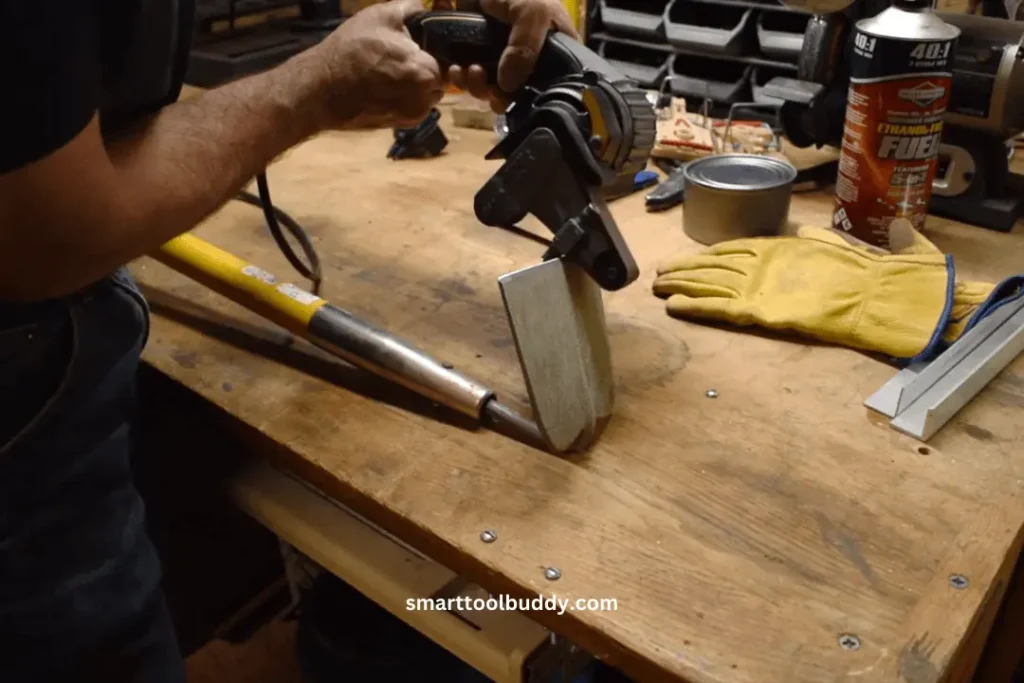
The best tool to sharpen your hoe will depend on your level of comfort and the state of your blade. These are two of the most popular choices:
- Metal File It is a cost-effective and versatile alternative for the majority of hoe sharpening requirements. Select a bastard cut file that has moderate coarseness to ensure efficient sharpening.
- Bench Grinder This powerful tool provides an easier sharpening process but it’s more difficult and requires more security measures. This guide will focus on using an iron file because it’s a good beginner alternative.
Table 1: Sharpening Tool Comparison
| Sharpening Tool | Pros | Cons |
| Metal File | Affordable, flexible, and excellent control | Process is slower |
| Bench Grinder | Sharpening speed is faster. | Safety gear required, and the possibility of overheating the blade |
Pro Tip: Regardless of the sharpening tool that you use, make sure you have a clean and well-ventilated area.
How to Use Garden Hoe
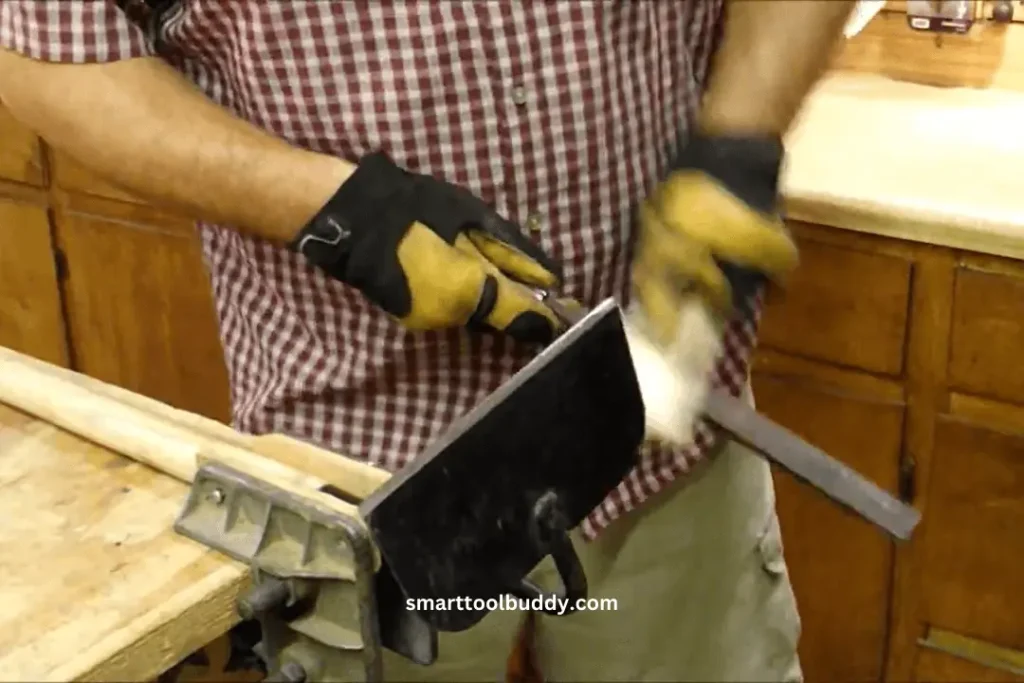
- The Art of Hoe Sharpening (how to use garden hoe)
- File Sharpening 101: No Experience Needed
- Handle Replacement Stories and Solutions
- Create Garden Rows Like a Pro
- Maintenance Tips from My Garden Journal
My Experience on How to Use Garden Hoe
(Because Every Gardener Needs This!)
| Hoe Type | When to Sharpen | What I Use It For | Pro Tip From Experience |
| Draw Hoe | Monthly | Daily Garden BFF | Watch those tomato roots! |
| Dutch Hoe | Every 6-8 weeks | Weed Warfare | Perfect for morning weeding |
| Warren Hoe | Before Heavy Use | Making Beautiful Rows | Your back’s best friend |
| Scuffle Hoe | Bi-weekly | Quick Cleanup | Great for loose soil |
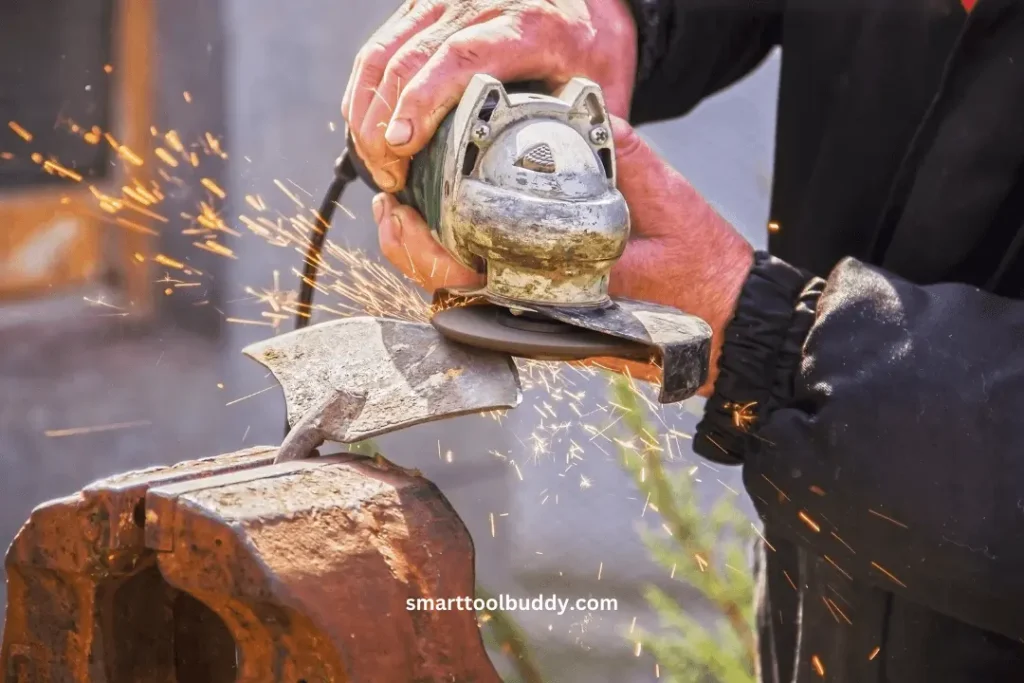
That is the common question how to sharpen garden hoe. Before sharpening any tool, safety is the most important thing. With your tools at hand and safety glasses in place, we’re ready to get down to work!
1. Secure the Hoe to know How to use Garden Hoe
If you own a vice, it may be useful to secure the hoe in order to facilitate sharpening. Secure the shank of your hoe tightly into the vice, making sure the blade is placed horizontally and is stable. If you don’t own a vice, just hold the hoe using your other hand while working on sharpening to know how to use garden hoe.
2. Identify the Bevel Angle
A bevel angle refers to the point at which the flat side of the blade is matched by the edge that has been sharpened. The majority of hoes have a bevel angle of between 15 and 20 degrees. While an exact angle isn’t essential, keeping an even angle during the process of sharpening will result in a neat and efficient edge.
Pro Tips: If you’re unsure about the angle of your bevel you should be towards an angle that is slightly higher (closer than 20°) to ensure greater durability.
3. Sharpening using the File
- Grab the file tightly: Use a comfortable grip that permits you to control your strokes.
- Keep the angle in place: Place the blade at the angle you want to bevel against the flat edge of the blade.
- Make long, even strokes. The file should be pushed away from you, and then across all of the lengths, ensuring constant pressure.
- The focus should be on both sides of the blade: Repeat the process for the opposite edge of blade keeping an angle of the same.
- Find burrs When you sharpen the file, tiny steel shavings (burrs) can appear on the opposite edge. Make sure to stop frequently and use an edge on the tool to scrape the burrs off.
Buy on Amazon: Hoe Garden Tool
4. Refining the Edge (Optional)
Once you’ve created a sharp edge you can improve it to create a smoother appearance (optional). Utilize the fine edge of the cutting file, or even a final one to complete this step. The procedure is similar to the first sharpening step, using lighter strokes, and focusing on achieving an edge that is smooth and polished.
5. Testing on Edge (Optional)
Once you’ve sharpened your harrow, you’re ready to test its new sharpness! Here are some methods to test the edge
- The paper Test: Carefully hold the paper at its edges and try to cut through it using the hoe’s blade. A well-cut hoe will effortlessly cut through the paper using the least amount of pressure.
- A Thumb Test: (Attention: Use caution with this test and try not to touch the edge that is sharp directly) Use your thumb to run it (along the edge of the thumb and not on the pad) slowly across the edge that has been sharpened. A hoe that is sharp will feel slightly nimble, while a dull hoe should feel smooth.
Keep in mind: Safety first! Do not test the sharpness of the hoe by rubbing the edge using your fingers.
How to Sharpen a Garden Hoe with a File: The Coffee-Break Guide
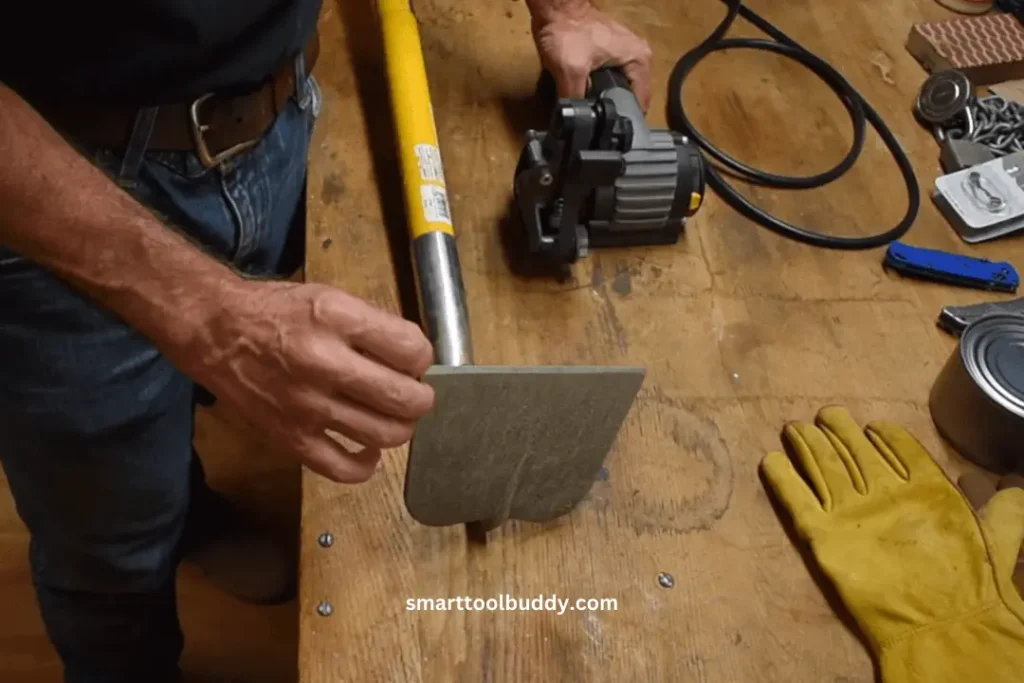
Points to focus on how to sharpen a garden hoe with a file
Listen, the first time I tried how to sharpen a garden hoe with a file, I was terrified I’d ruin my favorite tool. But here’s my foolproof method that works every time. the real answer of how to sharpen a garden hoe with a file
- Test it on a weed (the most satisfying part!)
- Get Comfortable:
- Grab your favorite garden stool
- Position yourself in the shade
- Keep that file handy
- The Real Deal on How to Sharpen a Garden Hoe with a File:
- Clean off the mud (yes, I sometimes forget too!)
- Find the original angle (it’s like finding the right radio station)
- Start filing with long, smooth strokes (think zen meditation)
Wear safety for Eye protection: how to sharpen a garden hoe with a file
- Use gloves when working: Gloves will shield your hands from cuts and blisters.
- Make sure the hoe is secured (optional but highly recommended): Using a vice to keep the hoe in place reduces the chance of it falling and causing injury.
- Hold firmly over the document: A controlled grip allows for a smoother sharpening process, and lowers the possibility of the file sliding.
- Be aware to your surrounding: Sharpen in a clean workspace free of debris or materials that ignite.
- Remove the Sharpness of your Body to answer the question on how to sharpen a garden hoe with a file…The file should be removed from you while making strokes to prevent accidental cuts.
The Joy To Know How To Sharpen A Garden Hoe with a File
You know that satisfying feeling when your hoe slices through soil like butter? That’s what proper garden hoe sharpening gives you. I now look forward to how to sharpen a garden hoe with a file because I know it makes every garden task easier.
Sharpening Like a Pro: Bonus Tips
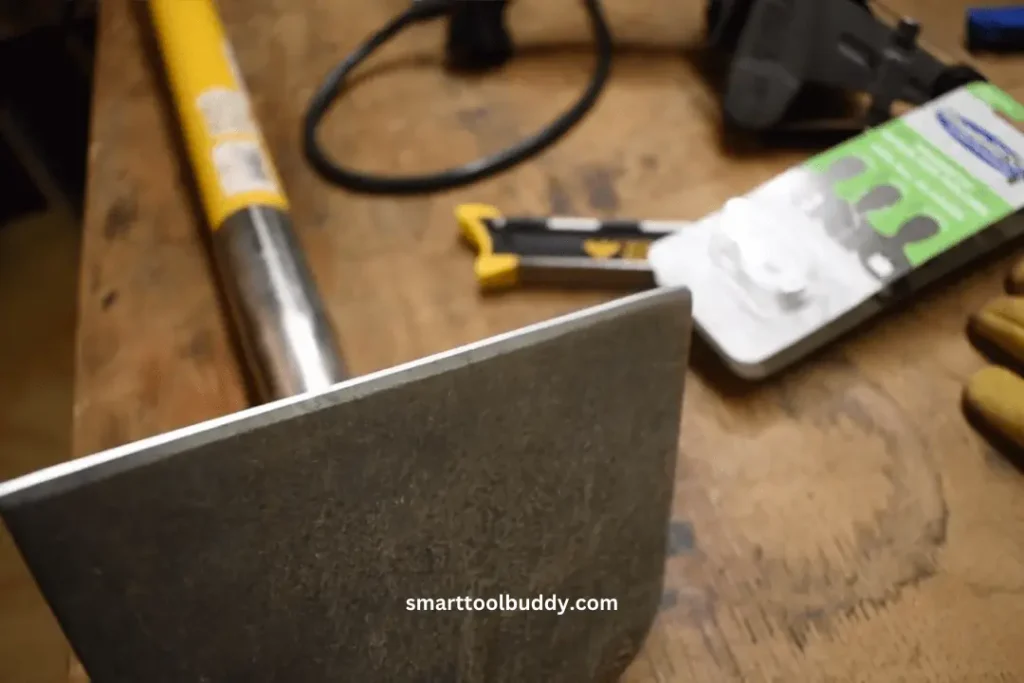
Here are a few additional suggestions to sharpen your hoe to be the best gardener in the world:
- Begin with a gentle finger: It’s easier to remove too little material than too much. It is possible to sharpen the edges further should you require.
- Maintain a constant angle: Consistency throughout the process of sharpening ensures a clear and smooth edge.
- Don’t overheat the tool: When using a bench grinder, be careful not to apply excessive pressure or holding the blade in one place for too long as it could cause the blade to overheat and harm the steel.
- Sharpen frequently: Regular sharpening helps keep sharp edges and eliminates the need for a lengthy sharpening afterward.
If you follow these easy steps and safety tips you will improve the sharpness of your hoe and ensure it will perform in the best way for many long times to be. Happy sharpening as well as happy gardening!
Conclusion on how to sharpen garden hoe with a file
A sharp hoe will make an enormous difference in your gardening. With just a bit of effort and the proper tools, you can transform your boring hoe into an effective weapon against weeds and soil that is compacted. This guide has provided you with the information and tools to sharpen your hoe as a professional, which will result in an easier, more effective gardening experience. Sharpening your hoe is a preventative step which saves time and energy in the longer term. So, take your file and follow these steps and you’ll be able to tackle your garden with an increased sense of pride in your DIY skills!
Frequently Asked Questions (FAQ) on how to make garden rows with a hoe.
Q: What is the proper way to sharpen a garden hoe?
The best method to sharpen hoes is the use of a file made of metal (ideally an abrasive cutting file) and keeping a constant degree throughout. This is a simple explanation:
- Place the hoe in the vice (optional) or keep it in place.
- Find the angle of bevel (around 15 to 20 degrees).
- Make longer, smooth strokes the file moving the file away from you and along every edge of your blade, keeping the same angle.
- Repeat the process on the opposite edge of the blade.
- (Optional) Finish the edges using a finishing file to create an even smoother surface.
Question: How can I sharpen my garden tools at home?
A majority of garden tools, including hoes, are sharpened at home using the use of a file made from metal. It’s similar to sharpening a hammer, however, there are slight differences based on the tool being sharpened. This guide outlines the general structure which can be modified for other gardening tools.
Q: how to replace a garden hoe handle:
Replacing a garden hoe handle is a simple process that starts with removing the old handle. First, remove any screws or nails from the metal head, then tap out the broken handle using a hammer and wooden block. Clean the eye (socket) thoroughly of any wood fragments or debris. Select a new hardwood handle that fits your hoe’s eye, and sand it if needed for a smooth fit.
Apply wood glue inside the eye of the hoe head, then insert the new handle, making sure the wood grain runs perpendicular to the blade for maximum strength. Tap the handle firmly into place using a mallet, then secure it by driving a metal wedge into the end of the handle, followed by a wooden wedge for extra stability. If your hoe head has a pre-drilled hole, add a screw through it for additional security. Let the glue dry for 24 hours, then sand any rough edges and apply linseed oil to protect the wood. Test the stability of your newly handled hoe before using it in your garden.
The entire process typically takes less than an hour of active work, costs under $15 for materials, and will give your hoe many more years of reliable service.
Q What is the angle to sharpen a hoe?https://amzn.to/40izWG1
The best angle for bevels on the blade of a hoe is between 15 and 15 degrees. A slight increase in angle (closer to 20 degrees) will provide greater longevity, while a less steep angle (closer to 15 degrees) could offer a sharper, but more fragile edge.
Q Can you sharpen a stirrup hoe?
Yes, you can sharpen a stirrup hoe by using the same methods similar to sharpening a regular hone. The sharpening process is focused specifically on cutting edges of a stirrup using the bevel angle to guide you and making long, consistent strokes using the file.
Also Read:
CONQUERING YOUR YARD: HOW TO REPLACE A RAKE HANDLE- A STEP-BY-STEP GUIDE

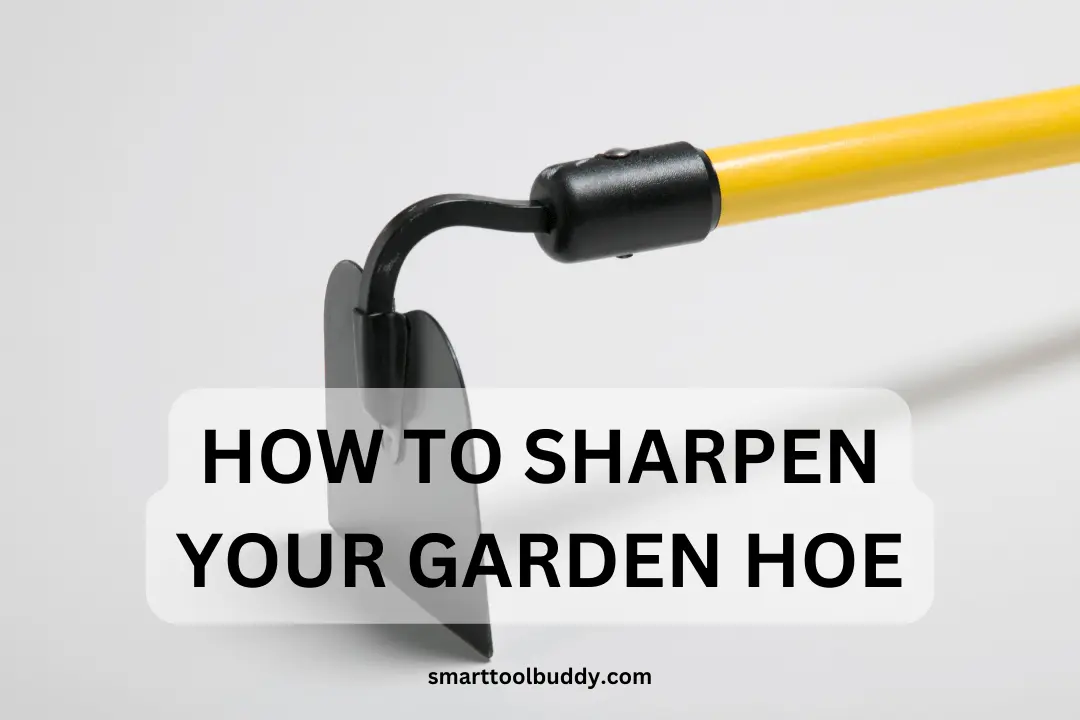
Related Blogs
How to Choose Essential Kitchen Cooking Tools
5 fun ways to use Red and white outdoor Christmas lights
Top Best Affordable Outdoor Lighted Christmas Trees Under $65
Effortless Electric Salt and Pepper Grinder Under $20
Top Dog Hoodies: Ultimate Comfort & Style for 2024-2025
Ultimate Small Dog Harness for Comfort & Safety Just $11!
Pet Bedding: Cozy & Stylish Options for Ultimate Comfort
The Top 10 Best Litter Box for Multiple Cats
5 Best Dry Cat Food for Indoor Cats 2024
Affordable Bluetooth Projector for Gaming: The Best in 2024
The Best Soundbar for Music and Movies for Home Threaters
Stay Powered Up: The Best Portable Charger for iPhone 15 in 2024
The iPhone 15 Pro Max New Features: Comprehensive Features
Liquid Screen Protector vs Tempered Glass: Which is better in 2024
What is a Monkey Wrench: Complete Details
Guide to Cleaning Your Gatorade Bottle The Proper Way
How to Use a Tack Hammer Nail it Every Time
Easy Ways on How to Clean Garden Tools at Home
Changing a Garden Cart Tire: Expert Hacks That Will Save You from $200+ in Repairs
How to Whisk Eggs: Easy Manual Techniques
Garden Fork Vs Pitchfork: Deciding Which Tool Will Meet Your Garden Needs
Conquering the Greens: How to Rake Artificial Grass
How Deep To Plant Daffodil Bulbs? A Simple Guide
How to Pick the Best Shovel for Digging in 2024
The best time to power rake your lawn
Why Your Kitchen Isn’t Complete Without an Acacia Cutting Board
How to Replace Trimmer Line in Bump Feed: Step-by-Step Guide
Perfect Make Matcha Without Whisk: The Ultimate Guide
10 Ways to Remove Snow from Driveway Without a Shovel: Innovative Snow Removal
The Ultimate Guide: How Many Wheelbarrows of Sand Per Bag of Cement
Don’t Make This Silly Mistake with Your 5 Uses of Garden Fork